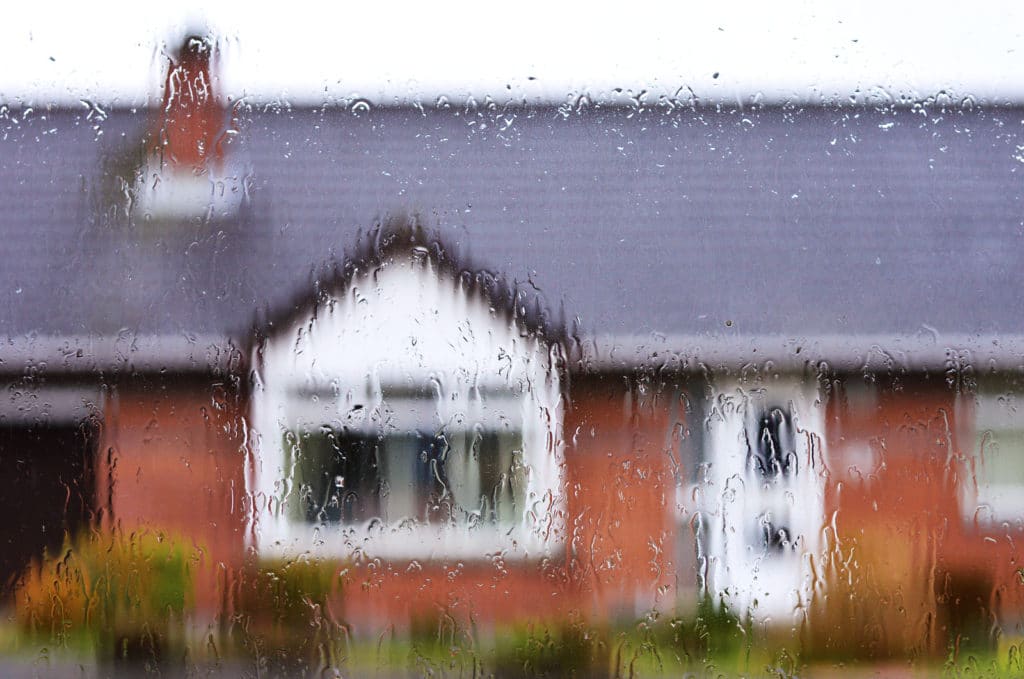Understanding exactly what an insurance policy does and does not cover can be extremely difficult and tedious. The fine print often contains some important exclusions, which leaves people questioning what really is covered. Water damage is one of those points that a lot many people don’t fully understand, as the water source and way of entry can completely change the view of the insurance provider. In this post, we will focus specifically on rain damage and coverage. We will explain what is usually covered, highlight two important exclusions, and provide our advice and things to remember when filing a claim and conducting repairs for water damage.
Does Homeowner’s Insurance Cover Rain Damage?
In general, homeowner’s insurance includes coverage for things that are associated with rain, such as tornadoes, hail, and lightning. Additionally, most insurance providers will cover damage that is incurred by rain itself. For instance, in a major storm, your roof could be damaged by the wind and rain, which would allow rain to leak into your house. In this situation, you would likely receive coverage for the roof and the damage inside your house.
However, you should not assume that you are covered from any storm-related damage. Here are some extremely important, common exclusions that you should understand.
-
Flooding: This is rarely included on a regular homeowner’s insurance policy. Floods are usually caused by rain, so this point can be confusing. The way insurance companies view it, if the rain that causes the damage has already touched the ground, then no compensation will be provided. Floods have the potential to cause extreme, expensive damage, which is why most insurance companies avoid it. Generally, flood insurance is a separate purchase that can be added to your homeowner’s insurance policy. Even in Arizona, flood insurance may be a good idea to protect your house during the stormy summer months. If you are interested in flood insurance, our team would be happy to find the coverage that meets your needs.
-
Preventable Damage: You will not receive compensation if the insurance adjuster determines that the damage was your fault. For instance, the adjuster could examine the damage and decide that a clogged gutter was the cause. While you may not have even known about the problem, it could prevent you from receiving coverage. To ensure that you would receive coverage for any rainstorm damage, be sure to keep up with maintenance on your house. Shingles, gutters, and drainage pipes are all important to keep in functional condition.
In the event that you do experience rain or storm damage, filing a claim and getting the damage repaired can be a tricky process. Here are our tips and things to remember when filing a claim and fixing the damage:
-
Document quickly and thoroughly: As soon as you realize that damage is beginning or going to occur, begin taking pictures. It is best to have beforehand pictures to compare to the damage, so it might be a good idea to take and keep a variety of pictures of your house.
-
Get an independent estimate: It may be a good idea to have an independent contractor examine the damage and provide you with an estimate. The majority of contractors will actually do this for free. Insurance companies sometimes suggest less money than what you would actually need to fix the damage. But if you have a higher estimate from an independent party, you have negotiation power in the case that the insurance adjuster suggests less money than you need.
-
The money doesn’t come all at once: Generally, insurance companies do not actually give you all your coverage money up front. Oftentimes, they will provide you half of what you need to begin the repairs. Sometime after the work is complete, they will give you the second half, minus whatever your deductible was.
-
Choose a covered water damage restoration company: Rain damage can be quite extensive. When that is the case, you may not have time to contact your insurance provider to arrange a plan of action. Instead, you may need to contact a water damage restoration company. Whatever company you choose, it is essential that you make sure they are covered by your insurance provider before you hire them.
While these are general truths and practices regarding rain damage, they are by no means set in stone or true for every policy. It is essential that you read the fine print to understand your plan and avoid unfortunate surprises. Ask questions and don’t assume that you are covered. Our team would love to help you understand your plan options, so give us a call at (623) 583-7999.

